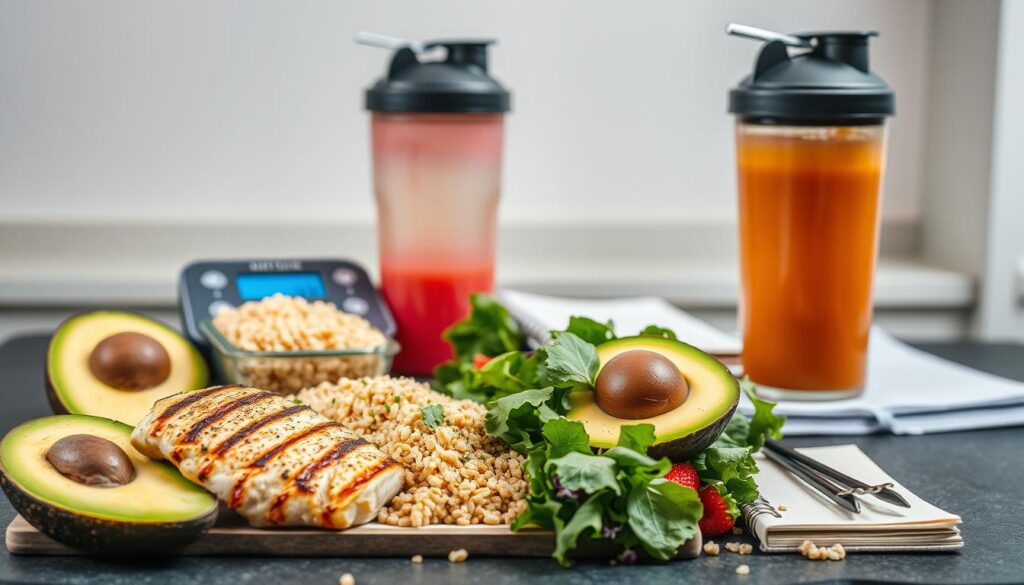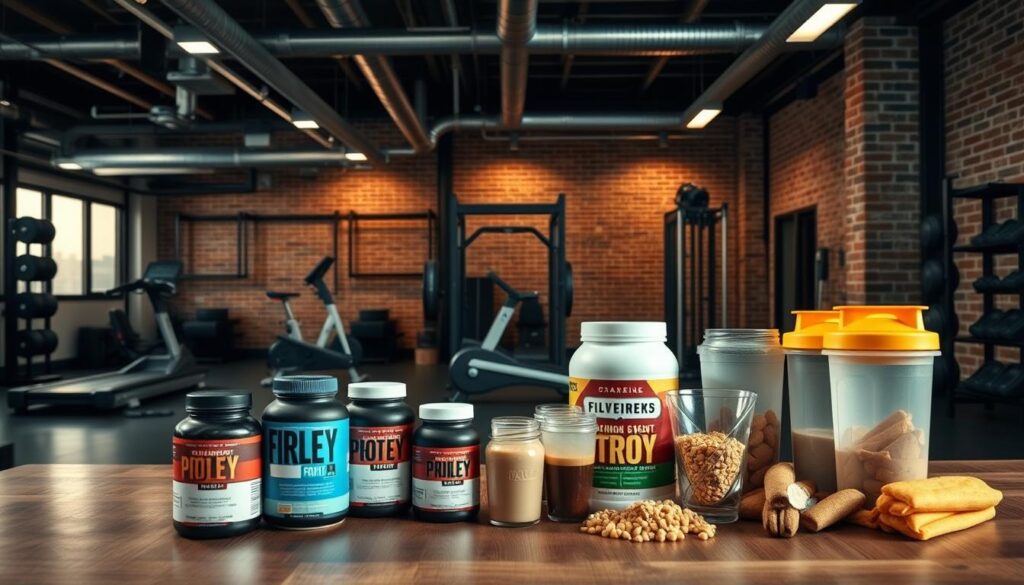Remember that sinking feeling when your energy crashes mid-workout? Or waking up sore for days after pushing your limits? I’ve been there too – exhausted despite giving my all. That changed when I realized my body wasn’t getting what it truly needed.
What you eat isn’t just about calories. It’s about creating a strategic partnership between your meals and movement. The right choices can turn grueling sessions into breakthroughs and recovery days into growth opportunities.
This guide cuts through the noise. You’ll learn how specific foods act like precision tools – boosting stamina during lifts, protecting muscle during runs, and helping you bounce back faster. These aren’t rigid rules, but science-backed adjustments that work with your unique routine.
Key Takeaways
- Nutrition directly impacts energy levels during exercise and recovery speed afterward
- Strategic meal timing enhances workout effectiveness more than random eating patterns
- Proper nutrient combinations prevent muscle breakdown and support growth
- Hydration works synergistically with food to maximize results
- Common diet mistakes often sabotage even the most disciplined training plans
Let’s transform how you approach fitness – not through deprivation, but by empowering your health with intelligent choices. Your next personal best starts here.
The Role of Pre-Workout Nutrition
Your energy levels during exercise aren’t just about willpower—they’re about preparation. What you consume before training acts like rocket fuel for your muscle engines. Let’s break down how to optimize this process.
Fueling with Carbohydrates and Protein
Carbs transform into glucose—your body’s preferred energy source during exercise. When stored as glycogen, this fuel powers through activities like weightlifting or sprinting. Pair them with protein to kickstart muscle repair before your first rep.
Research shows protein eaten 1-2 hours pre-workout boosts amino acid availability. This helps reduce muscle breakdown during intense sessions. A strategic meal timing approach creates a powerful combo:
| Nutrient | Function | Example Foods |
|---|---|---|
| Carbs | Replenish glycogen stores | Oats, bananas |
| Protein | Trigger muscle synthesis | Greek yogurt, eggs |
| Both | Sustain energy + repair | Peanut butter toast |
Understanding Meal Timing and Portion Sizes
Large meals need 3-4 hours to digest. Smaller snacks work best 30-90 minutes pre-workout. Listen to your body—some thrive with a banana 20 minutes before lifting, others need complex carbs earlier.
Portion control prevents sluggishness. Aim for 0.5g of carbs per pound of body weight for moderate sessions. Combine with 15-20g protein for maximum muscle protection. This balance keeps energy steady without stomach discomfort.
Mastering Your Pre-Workout Meal Strategy
Ever notice how some days you power through lifts while others feel like dragging weights through mud? The difference often starts in your kitchen. Strategic fueling turns ordinary sessions into breakthrough moments.

Ideal Pre-Workout Foods and Snacks
Your body needs specific nutrients at precise times. This table shows how to match food choices with your schedule:
| Nutrient Combo | Timing | Examples |
|---|---|---|
| Carbs + Protein | 30-60 minutes prior | Greek yogurt + berries |
| Quick Carbs | Under 45 minutes | Banana + almond butter |
| Balanced Meal | 2-3 hours before | Oatmeal + eggs + avocado |
Low-fat chocolate milk works wonders if solids unsettle your stomach. It delivers nutrients fast without weighing you down.
Digestive Considerations and Energy Boosters
Time crunch? Reach for easily digestible foods like rice cakes or dried fruit. These provide instant energy without stomach drama.
“Nutrient timing isn’t about perfection – it’s creating metabolic readiness for physical demands.”
Nuts offer sustained energy but need more digestion time. Pair them with raisins if eating 90+ minutes pre-workout. Listen to your body – what works at 7 AM might differ from 5 PM sessions.
Remember: 200-250 calories hits the sweet spot. Too little leaves you drained; too much turns you sluggish. Find your formula through trial and adjustment.
Guidelines for Effective Post-Workout Nutrition
Ever feel like your muscles are whispering for help after a tough session? What you eat next determines whether they rebuild stronger or stay fatigued. This phase turns sweat into progress through smart recovery strategies.

Replenishing Glycogen and Repairing Muscles
Your body becomes a nutrient sponge post-exercise. Carbohydrates refill glycogen stores drained during activity, while protein stitches microscopic muscle tears. Research shows consuming both within 45 minutes accelerates recovery by 50% compared to waiting hours.
Aim for a 3:1 carb-to-protein ratio. This balance sparks insulin release, driving nutrients into cells faster. Chocolate milk works surprisingly well – its natural sugars and whey protein hit the perfect mix.
Smart Snack and Meal Options for Recovery
Not all fuel works equally. These combos deliver results without digestive stress:
| Snack | Timing | Benefits |
|---|---|---|
| Apple + almond butter | Immediately post-workout | Fast-digesting carbs + healthy fats |
| Edamame + dried fruit | Within 1 hour | Plant protein + glycogen reload |
| Hummus + veggies | 2 hours later | Sustained amino acid release |
Regular gym-goers training moderately don’t need special shakes. As recovery experts note, whole foods in your next meal often suffice. Save intense refueling for marathon prep or heavy lifting cycles.
Listen to your body’s signals. Lingering soreness or energy crashes mean you need more protein and complex carbs. Quick bounce-back? Your standard diet’s likely covering the basics.
Hydration and Supplementation Before and During Workouts
Your body operates like a high-performance engine – without proper fluids, even the best fuel won’t spark progress. What you drink matters as much as when you drink it. Let’s explore how strategic hydration keeps your systems firing.
Effective Hydration Strategies for Optimal Performance
Timing your water intake creates a hydration buffer. Start early – the American College of Sports Medicine advises sipping 16oz over 4 hours pre-workout. This gradual approach prevents sloshing during activity.
| Timing | Fluid Intake | Purpose |
|---|---|---|
| 4 hours pre-session | 16-20oz water | Baseline hydration |
| 30 minutes pre-session | 8oz water | Final top-up |
| During endurance session | 7-10oz every 20min | Maintain performance |
| Post-session | 16-24oz + electrolytes | Replenish losses |
For endurance activities exceeding 60 minutes, add 30-60g fast-acting carbs hourly. Sports drinks work, but natural options like dates or maple water avoid artificial additives.
“Begin hydrating at least four hours before exercise – this allows proper fluid absorption without gastrointestinal distress.”
Monitor urine color – pale yellow signals readiness. Darker shades mean drink more. Post-session, coconut water restores potassium better than plain water. Remember: thirst lags behind actual needs. Stay ahead by scheduling sips.
Pre- and Post-Workout Nutrition Tips for Better Performance
What separates good training days from great ones often comes down to kitchen prep. Let’s translate theory into action with concrete solutions tailored to your sweat sessions.
Energy-Boosting Recipes Made Simple
Try these Honey-Roasted Energy Bites when time crunches hit:
- 1½ cups dry roasted peanuts
- 1½ cups pitted dates
- ½ tsp sea salt (optional)
Blend ingredients until sticky. Roll into 20 balls. Each delivers 15g carbs – ideal for high-intensity sessions exceeding 30 minutes. Store frozen for three months.
Custom Plans for Diverse Goals
Your body needs change with activity type and duration. This table clarifies fueling strategies:
| Workout Type | Duration | Fuel Strategy |
|---|---|---|
| Weight Training | 45-60 min | Pre-session protein + intra carbs |
| Endurance Run | 90+ min | Hourly 30g carbs + electrolytes |
| Hot Yoga | 60 min | Extra sodium pre/post session |
Adjust intake based on sweat rates. Those losing >2% weight through fluids need more electrolytes. Track energy levels 24 hours post-workout – lingering fatigue signals inadequate amino acids or calories.
Marathoners benefit from carb-loading 48 hours pre-race. Casual gym-goers? Focus on balanced meals. Remember: nutrition plans evolve as your sports goals shift.
Conclusion
How often do you finish a workout feeling drained instead of accomplished? Your nutrition choices directly shape this outcome. Small adjustments create big differences – like matching carb timing to activity length or choosing fast-digesting protein after resistance training.
Start by viewing meals as strategic partners in your fitness journey. Whole foods beat processed supplements for sustained energy. A banana with almond butter pre-session fuels better than caffeine crashes. Post-session, chocolate milk’s natural combo of sugars and whey accelerates recovery.
Hydration matters just as much as solid fuel. Electrolyte-rich drinks prevent cramps during long workouts. Pair them with easily digestible carbs for endurance events. Listen to your body’s signals – lingering fatigue often means needing more amino acids or complex carbs.
Your health thrives when food becomes intentional. Track how different nutrient ratios affect your stamina and soreness. Progress happens through consistent tweaks, not overnight overhauls. What you eat today builds tomorrow’s personal best.
